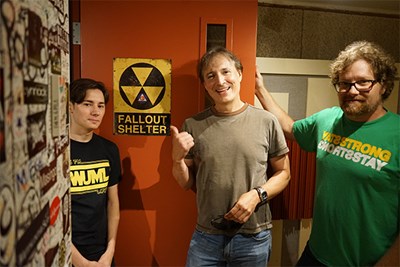The White Album and Dark Times

11/15/2018
By David Perry
A faraway war with a close-to-home price. Student protests. Political upheaval. Psychedelic experimentation. Amps cranked to 11. Some people were lost, others found.
It was 1968.
Five men, all old enough to remember their draft lottery numbers, recently held forth on that tumultuous year, using the Beatles’ music as a touchstone.
On the eve of the re-release of elaborate, remastered versions of the two-LP “The Beatles” – better known as “the White Album” – Prof. Bob Forrant (history) and Prof. Will Moylan (music), visiting lecturer Greg DeLaurier (political science and Honors College), retired Director of Community Relations Paul Marion and Emeritus Prof. John Wooding (political science) drew an audience of about 70 to the panel discussion “Helter Skelter: 1968, The Year That Transformed a Nation.”
Wooding described 1968 as “a pivotal year in the U.S. and globally.”
A native of England, he watched student protestors take over Paris in 1968 as well as the Prague Spring in Czechoslovakia that led to a communist retreat until the Soviets suppressed the uprising.
Forrant, who was beaten among other Democratic Convention protestors that year in Chicago and kicked out of his own Northeastern University graduation ceremony for insisting that students be allowed to speak out about the war in Vietnam, said that rock music “was the way that people coped with all of it.” The war flashed across TV screens, and houses divided along generational lines.
“Music was always a backdrop to the politics of the time,” he said.
Marion recalled that in 1968, Lowell was still in the midst of a slow-motion municipal decline.
Between 1930 and 1960, 20,000 people had moved out of Lowell, he said. The mills that once powered the city had moved south or closed, forcing people to look elsewhere for their livelihoods.
“But even in the midst of economic stress, Lowell had an active and fairly successful downtown, with multiple department stores, shoe stores, two five-and-dimes. If you lived here, it was not a ghost town,” Marion said.
Throughout the 1960s, rock ’n’ roll was alive and well in Lowell, especially at the Commodore Ballroom on Thorndike Street (on the site of what is now the Gallagher Transportation Terminal), which served up bands like the Doors, Cream, the Kinks and the Yardbirds.
“There was an active music consumer culture,” said Marion, noting that downtown Lowell then had two record stores.
Throughout the economic decline, the war protests and the social upheaval, music – and especially the Beatles – provided a balm that soothed the collective soul of young people who tuned in, Marion said.
Moylan, the music professor, provided context for the sprawling White Album’s musical and cultural significance.
With 30 stylistically diverse songs, the double album “had a lot of fingerprints on it,” said Moylan. “For the first time, we got a sense of the Beatles as soloists.” He said that for all that has been said about tension within the band, “There was a lot of joy in the studio.”
The White Album, Moylan reminded the audience, arrived just a year after “Sgt. Pepper’s Lonely Hearts Club Band,” with its memorable songs and boundary-pushing production that altered the landscape of pop culture.
By contrast, he said, the White Album is the sound of “four folks growing, and growing apart.”
Forrant was in line with everyone else when the White Album went on sale. He bought it at the Harvard Coop for $3.85.
He took it home “to criticize it as much as to listen. When I listen now, I am indelibly transformed backwards. Music is an inescapable part of defining who I am.”
DeLaurier, who was an 18-year-old college student at the time, felt lost in 1968, cast adrift by the upheaval and uncertainty.
“It was a brutal year. Leaders were dying; the war was going on. Every week, 200 (to) 250 American soldiers were coming home in boxes,” he said. But a bright spot in all of that was the music that was being produced.
“Above all else was the music,” he said. It was a place of refuge and a force of unity among young people.
He clapped a rhythm and led the crowd in a few verses from “Yellow Submarine” and “Give Peace A Chance.”
The event, bringing people together to reflect, discuss and learn, is part of Wooding’s vision of Lowell as a UNESCO City of Learning, where the city’s substantial educational resources are shared with the community.
The evening impressed Nick Brennen, a freshman psychology major and Honors College student.
“There was a lot going on in that decade,” said Brennen. “But life carried on just as it does now. It’s amazing how music makes life better. You can take a sad song and make it better, I guess.”



